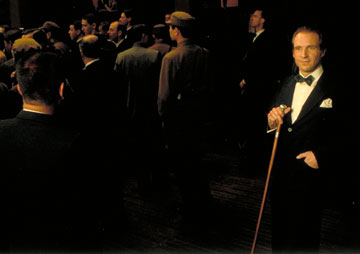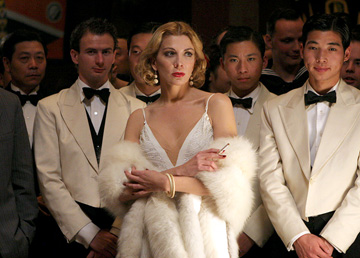

The White Countess marks the end of an era for Merchant Ivory Productions. Director James Ivory and producer Ismail Merchant (who passed away the film was completed) have been making movies together for nearly forty-five years. Although their recent efforts (Le Divorce, The Golden Bowl) have not been that great, their best films are sumptuous period pieces with meticulous attention to production value and acting. The White Countess falls comfortably in the latter. It is a lovely well-acted film, and also happens to be a family affair, with sisters Vanessa and Lynn Redgrave acting together with Natasha Richardson, Vanessa's daughter. Add in Ralph Fiennes, Allan Corduner, and Hiroyuki Sanada and the cast is very impressive.
The story, by renowned author Kazua Ishiguro (The Saddest Music in the World, The Remains of the Day) is not as impressive. The real asset of The White Countess is its acting caliber. Ishiguro's screenplay is a bit on the languid side, especially in the first half. The movie is probably close to an hour longer than it needs to be, but again, this does provide more time to admire the pretty visuals and the Christopher Doyle (Eros, 2046). Ishiguro sets the story in mid-1930s Shanghai in a community of ex-patriates. War is beginning to rear its ugly head in the form of Japanese aggression. Amidst all of this lives Countess Sofia Belinsky (Richardson, Asylum, Maid in Manhattan) and her family. They are living in exile, trying to survive in Belinsky's meager salary, a far cry from their life of luxury in Russia. Belinsky works in a nightclub, where she is not above prostituting herself for money. Her aunts Sara (Vanessa Redgrave, The Keeper, Good Boy!) and Olga (Lynn Redgrave, Kinsey, Peter Pan) highly disapprove of her occupation, although it is their main source of income. They conspire to keep Belinsky's daughter Katya (Madeleine Potter, Refuge, The Golden Bowl).
Todd Jackson (Fiennes, The Constant Gardener, Harry Potter and the Goblet of Fire) becomes a sort of salvation for Belinsky. He is an American who used to work in diplomatic circles, although now he aspires to open an upscale nightclub. He is also blind, a trait added late in the preproduction process. Jackson falls madly in love with Belinsky, and convinces her to work in his nightclub. He calls it The White Countess, after her. There, she can make money in a manner that is not demeaning to her. It allows Belinsky and Jackson to begin an extremely tentative courtship with each other, which is the heart of the movie. Both, but especially Belinsky, are afraid to open up to the other person. Jackson hides behind the ruse that he wants to keep their relationship professional, and would rather not hear about her private life.